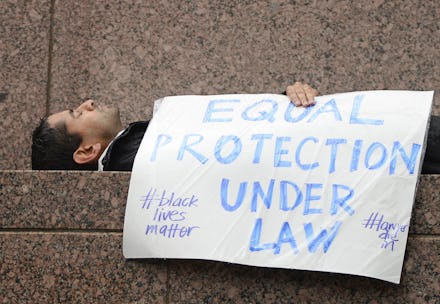Americans Haven't Been This Concerned About Racism in More Than 20 Years

Thousands of protesters in cities across the country have vowed to "shut it down" until there's justice for the many unarmed black people killed by police, and new polling suggests that these efforts could very well be successful in generating renewed focus on racism in America.
For the first time in more than two decades, a significant proportion of Americans named racism the country's most important problem. According to Gallup's latest poll, it's a belief shared by as many as 13% of respondents — a figure that just sharply rose from the single digits.
That number may seem small, but the details reveal a deeper truth. For anyone who believes these protests and acts of civil disobedience are nuisances or a waste of time, the data suggests otherwise.
Here's what the data shows: The last time this figure tracked as high was 1992, when 15% of Americans said race relations were the biggest issue facing the country. That year is significant: April 1992 saw four Los Angeles Police Department officers acquitted in the brutal beating of Rodney King, an unarmed black man severely brutalized by white patrolmen at the end of a highway chase. The ruling itself incited a week of nonstop rioting in Los Angeles, which claimed 54 lives and $1 billion in property damage.
Decades later, there are unfortunate common denominators underlying the recent spate of civil unrest. 2014's two most high-profile cases, the shooting of Michael Brown and the chokehold death of Eric Garner, both recently resulted in grand juries not indicting the officers involved. Pending federal investigations, neither case will see a day in court with a full trial, despite the ample availability of evidence, conflicting information and widespread public scrutiny.
Why it matters: With the situation in Ferguson, Missouri, some rioted after the jury's decision was announced, the moment itself moving years of institutional racism and strained community relations in the area to a fever pitch. Those images — of burning buildings, cars set ablaze and businesses destroyed — captivated millions during media coverage.
And in the process, protesters have challenged elected officials and the general public to grapple with an unfortunate everyday reality for black and brown people in America. The influence is so strong that racism now ties with the economy in polling about the nation's most important problems. Only "the government" tracked slightly higher.
Even more revealing, Gallup also found that non-whites are more than twice as likely as white people to view racial issues as the country's largest problem. So even though there's heightened awareness about racism nationwide, a divide still remains. And it reinforces the privilege many white people have: Unlike their peers of color, whites almost never have to seriously think about racism until forced to by circumstances beyond their control.
For a country that's long stressed the need for a "national conversation" about race, the new polling data suggests recent events have generated much-needed dialogue about it. Instead of running away from this opportunity, perhaps it would benefit everyone to seize the moment and question their beliefs and preconceived notions about racism in America.